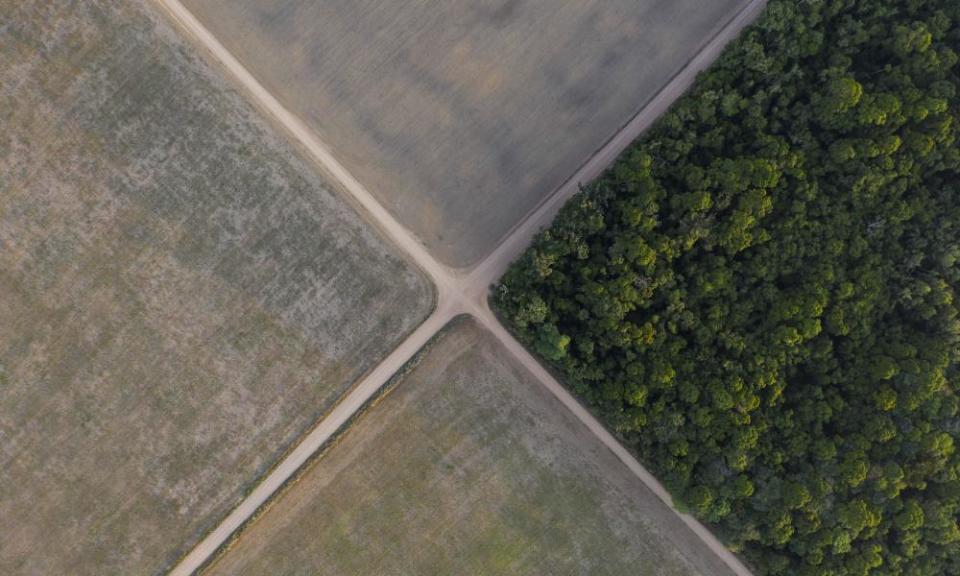Australia joins US, China and Russia in refusing to sign leaders' pledge on biodiversity

The Morrison government has said it refused to sign a global pledge endorsed by 64 countries committing them to reverse biodiversity loss because it was inconsistent with Australia’s policies.
Emmanuel Macron, Angela Merkel, Justin Trudeau, Jacinda Ardern and Boris Johnson are among world leaders who signed the Leaders’ pledge for nature which was launched on Monday ahead of a major UN summit on biodiversity being hosted virtually from New York. The summit is working towards a Paris-style global agreement on nature.
The federal government was invited to sign but refused because the 10-point plan calls for commitments that are inconsistent with Australian policy – including a greater ambition to reduce greenhouse gas pollution and reach net zero emissions by 2050.
A spokesman for Morrison said: “Australia has already committed to a net zero emissions target by the second half of the century as set out in the Paris agreement.”
“We will not agree to other targets unless we can tell the Australian people what they will cost to achieve and how we will achieve it,” he said. The spokesman said “we want to achieve net zero emissions as soon as possible” and pointed to the government’s recently released technology roadmap.
Related: World fails to meet a single target to stop destruction of nature – UN report
Apart from Australia, other countries that didn’t sign the pledge include the United States, Brazil, China, Russia and India.
The pledge warns humanity is in a state of “planetary emergency” due to the intertwined crises of biodiversity loss, ecosystem degradation and climate change. It states that the decline of the natural world is accelerating at an unprecedented rate.
“Nature fundamentally underpins human health, wellbeing and prosperity,” the pledge states. “We need to appropriately value nature and the services it provides as we make decisions and recognise that the business case for biodiversity is compelling.”
Australia was recently singled out for mammal extinction in a UN report that found the world had failed to meet a single target to slow the loss of the natural world and preserve land and marine ecosystems.
The pledge promises a stronger global effort to reduce deforestation, halt unsustainable fishing practices, eliminate environmentally harmful subsidies and begin the transition to sustainable food production systems and a circular economy during the next decade.
Leaders promised to ensure “biodiversity, climate and the environment as a whole” were at the heart of responses to the economic crisis brought on by the Covid-19 pandemic.
“Against the backdrop of Covid-19, which has crippled the world’s economies and pressured governments everywhere to begin the process of rebuilding and renewing, decisions made now will have ramifications for all of us and for generations to come,” the pledge states.
Labor’s environment spokeswoman, Terri Butler, said the prime minister, Scott Morrison, should explain why Australia would not commit to a stronger effort to protect wildlife.
“Australia is in the midst of an extinction crisis, 3 billion animals have died or were displaced by last summer’s bushfires and 12m hectares of land burnt . But the Morrison government doesn’t think we have a problem,” Butler said.
The Greens environment spokeswoman, senator Sarah Hanson-Young, said a global target on extinction, similar to the Paris target, was necessary to stem the rapid loss of biodiversity.
She said Australia was “squandering an opportunity” to take a leading role after the bushfire crisis, which accelerated the loss of habitat and wildlife and has forced the government to consider new threatened listings for iconic species, including the koala.
“Our biodiversity is under significant threat and with it our tourism industry and local economy,” Hanson-Young said. “Australia’s lack of commitment at this summit is shameful and ultimately will be bad for our economy, as well as our environment.”
Tim Beshara, federal policy director at the Wilderness Society, said world leaders who visited Australia were immediately introduced to a koala.
“If prime minister Morrison isn’t willing to tell the world we are committed to ending species extinction in Australia, what level of extinction is he willing to tell Australians he is happy with?” he said.
Sir Robert Watson, chair of the Intergovernmental Science-Policy Platform on Biodiversity and Ecosystem Services (IPBES), described the pledge as “outstanding” and praised the links leaders had made between the destruction of the natural world and the sustainable development goals. But Watson cautioned what was possible without the signatures of major polluters.
“Many of the most important countries in the world that are causing climate change due to their emissions of greenhouse gases, and/or are destroying their biodiversity, are not signatures to this pledge. Without countries such as the USA, Brazil, China, Russia, India, and Australia we cannot succeed in achieving the Paris climate goal or halting and ultimately reversing the loss of biodiversity,” he said.

